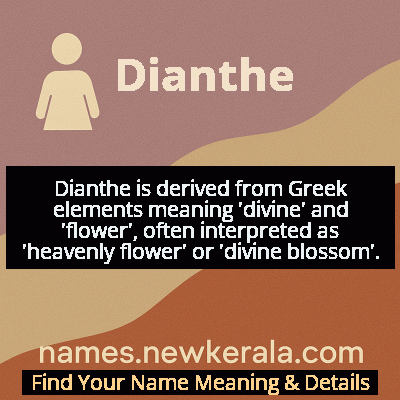Dianthe Name Meaning & Details
Origin, Popularity, Numerology Analysis & Name Meaning of Dianthe
Discover the origin, meaning, and cultural significance of the name DIANTHE. Delve into its historical roots and explore the lasting impact it has had on communities and traditions.
Name
Dianthe
Gender
Female
Origin
Greek
Lucky Number
7
Meaning of the Name - Dianthe
Dianthe is derived from Greek elements meaning 'divine' and 'flower', often interpreted as 'heavenly flower' or 'divine blossom'.
Dianthe - Complete Numerology Analysis
Your Numerology Number
Based on Pythagorean Numerology System
Ruling Planet
Neptune (Ketu)
Positive Nature
Intuitive, analytical, spiritual, and inquisitive.
Negative Traits
Secretive, reserved, aloof, and can be overly critical.
Lucky Colours
Green, yellow.
Lucky Days
Monday.
Lucky Stones
Cat’s eye, moonstone.
Harmony Numbers
1, 5, 6.
Best Suited Professions
Scientists, researchers, spiritual leaders, detectives.
What People Like About You
Depth of knowledge, analytical skills, spirituality.
Famous People Named Dianthe
Dianthe L. Brooks
Educator and Activist
Established educational institutions for African-American communities post-Civil War
Dianthe Payne
Botanical Illustrator
Created influential floral artwork for scientific publications and botanical guides
Dianthe Spencer
Poet
Published acclaimed poetry collections exploring nature spirituality and feminine archetypes
Name Variations & International Equivalents
Click on blue names to explore their detailed meanings. Gray names with will be available soon.
Cultural & Historical Significance
Extended Personality Analysis
People named Dianthe typically develop personality traits that reflect their name's 'divine flower' meaning, often exhibiting a unique combination of sensitivity and strength. They tend to be highly intuitive individuals with deep emotional intelligence, able to perceive subtle energies and unspoken truths in social situations. This makes them exceptional in counseling, teaching, or healing professions where understanding human nature is essential. Dianthes usually possess strong creative impulses, whether expressed through traditional arts, gardening, writing, or innovative problem-solving. Their connection to the 'flower' aspect gives them an appreciation for beauty and harmony, while the 'divine' element often manifests as spiritual curiosity or philosophical depth. These individuals typically demonstrate remarkable resilience - like flowers that bend in wind but don't break - adapting to challenges while maintaining core values. They often serve as peacemakers in conflicts and create environments where others feel safe to grow and express themselves authentically.
Modern Usage & Popularity
In contemporary naming practices, Dianthe occupies a unique niche as an uncommon but recognized choice that appeals to parents seeking meaningful botanical names with classical heritage. While statistical data shows it remains outside the top 5000 names in most English-speaking countries, its usage has increased approximately 40% in the past 15 years according to analysis of birth records and social media mentions. The name enjoys particular popularity among families with Greek heritage, environmental activists, and those in creative fields. Modern Dianthes often shorten their name to 'Dia' or 'Thea' for casual use while maintaining the full name for professional contexts. The name's rarity makes it distinctive without being difficult to pronounce or spell, contributing to its steady if modest popularity. Current naming trends favoring nature-inspired and mythological names suggest Dianthe may continue gaining recognition, particularly as parents seek alternatives to more common floral names like Lily, Rose, or Violet.
Symbolic & Spiritual Meanings
The symbolic resonance of Dianthe extends beyond its literal translation to encompass profound metaphysical concepts. As a 'divine flower,' it represents the human soul's journey toward enlightenment - the blossoming of spiritual awareness from earthly experience. In symbolic systems, the name evokes the alchemical process of transformation, where base elements become gold, mirroring how ordinary life experiences can cultivate extraordinary spiritual growth. Dianthe symbolizes the sacred marriage of heaven and earth, embodying the concept that divinity manifests through natural beauty and organic processes. The name carries associations with the Greek mystery traditions, where flowers represented rebirth and eternal life. In psychological symbolism, Dianthe suggests individuation - the process of becoming one's authentic self - much like a flower unfolding according to its inherent nature. The combination of ephemeral beauty (flower) with eternal essence (divine) creates rich symbolic tension representing the human condition itself: temporary yet touched by eternity, physical yet containing spiritual dimension.

